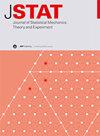成群系统的边界对称破缺
IF 1.9
3区 物理与天体物理
Q2 MECHANICS
Journal of Statistical Mechanics: Theory and Experiment
Pub Date : 2024-08-22
DOI:10.1088/1742-5468/ad6c2e
引用次数: 0
摘要
我们考虑了一个横向限制在两个无限反射平行壁之间的成群系统,两壁之间的距离为 L⊥。假定在集体运动方向的纵向上存在无限或周期性的边界条件,从而定义了一个典型的环形几何图形,该几何图形是实验中实现的成群活动胶体。这种限制选择了平均方向平行于壁的成群状态,从而通过边界效应在局部明确打破了旋转对称性。有限尺寸缩放分析和数值模拟表明,束缚会引起有效质量项 Mc∼L⊥-ζ(正ζ等于自由理论的动态缩放指数),从而抑制小波数下的无尺度相关性。然而,由于横向的系统尺寸有限,只有在纵向系统尺寸足够大时(即窄环几何结构)才能检测到这种效应。此外,在纵向上,密度相关性的特征是异常有效质量项。有效质量项还增强了全局标量有序参数,抑制了平均成群方向的波动。这些结果表明,横向约束与均匀外部场驱动之间是等价的,后者在全局水平上打破了旋转对称性。本文章由计算机程序翻译,如有差异,请以英文原文为准。
Boundary symmetry breaking of flocking systems
We consider a flocking system confined transversally between two infinite reflecting parallel walls separated by a distance
L ⊥ . Infinite or periodic boundary conditions are assumed longitudinally to the direction of collective motion, defining a ring geometry typical of experimental realizations with flocking active colloids. Such a confinement selects a flocking state with its mean direction aligned parallel to the wall, thus breaking explicitly the rotational symmetry locally by a boundary effect. Finite size scaling analysis and numerical simulations show that confinement induces an effective mass term
M c ∼ L ⊥ − ζ (with positive ζ being equal to the dynamical scaling exponent of the free theory) suppressing scale free correlations at small wave-numbers. However, due to the finite system size in the transversal direction, this effect can only be detected for large enough longitudinal system sizes (i.e. narrow ring geometries). Furthermore, in the longitudinal direction, density correlations are characterized by an anomalous effective mass term. The effective mass term also enhances the global scalar order parameter and suppresses fluctuations of the mean flocking direction. These results suggest an equivalence between transversal confinement and driving by an homogeneous external field, which breaks the rotational symmetry at the global level.
求助全文
通过发布文献求助,成功后即可免费获取论文全文。
去求助
来源期刊
CiteScore
4.50
自引率
12.50%
发文量
210
审稿时长
1.0 months
期刊介绍:
JSTAT is targeted to a broad community interested in different aspects of statistical physics, which are roughly defined by the fields represented in the conferences called ''Statistical Physics''. Submissions from experimentalists working on all the topics which have some ''connection to statistical physics are also strongly encouraged.
The journal covers different topics which correspond to the following keyword sections.
1. Quantum statistical physics, condensed matter, integrable systems
Scientific Directors: Eduardo Fradkin and Giuseppe Mussardo
2. Classical statistical mechanics, equilibrium and non-equilibrium
Scientific Directors: David Mukamel, Matteo Marsili and Giuseppe Mussardo
3. Disordered systems, classical and quantum
Scientific Directors: Eduardo Fradkin and Riccardo Zecchina
4. Interdisciplinary statistical mechanics
Scientific Directors: Matteo Marsili and Riccardo Zecchina
5. Biological modelling and information
Scientific Directors: Matteo Marsili, William Bialek and Riccardo Zecchina

 求助内容:
求助内容: 应助结果提醒方式:
应助结果提醒方式:


